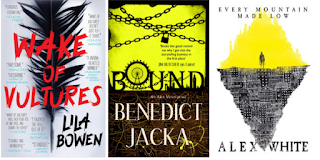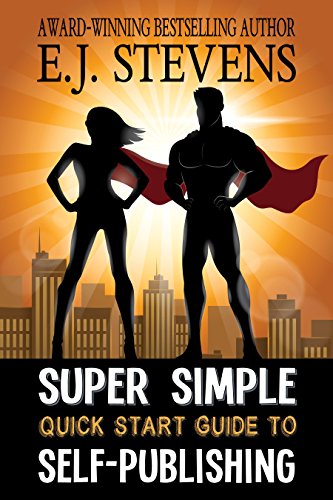So, as I have said to several people in the last few years, I can be a luddite. I can be stubborn and I can even be down right repetitiously set in my ways. The subject in this case is self-publishing. Listen the fact of the matter is I've seen a LOT of people selling their self-pubbed books from the backs of their cars, both to individuals and in some cases even selling successfully to bookstores. I'm not saying that the works were amateurish, I'm just saying that you shouldn't have your seven-year-old nephew do the book cover, your auntie Mildred (You know, the one with dyslexia?) do the editing or your cousin with the xerox machine do your printing. It was about that bad when I was starting out. Mock me if you will, but those of us who have been there know the truth. There was a reason that self-publishing was sneered down at with open contempt. Most of the editing done was on par with one of my first drafts, before I proof it. That, folks, is just plain not pretty.
Well, over the last decade or so I've slowly learned a lesson. Self-publishing is like anything else. There's a right way and there's a wrong way. Only, until very, very recently in the history of publishing, doing it the wrong was was easier and far more common.
J.A. Konrath certainly deserves a great deal of credit. Not only was he really one of the pioneers of the new self-publishing frontiers, he was also one of the first to point out how he did it and make regular reports. He had a step up, of course. he had a traditional career as a best selling author to help boost his name and he's wise enough to use that momentum and keep going. The man is practically an empire these days. complete with other people writing novels in his world and making profits as well, provided they receive Joe's approval. That's damned impressive.
But in my mind he was the exception, and not the rule. There are always exceptions, right?
Enter
E.J. Stevens. Last year at Boskone, a fantasy convention set in Boston, E.J and I were on a panel together. I couldn't even tell you which one anymore, (I THINK it was on keeping old myths alive in horror and urban fantasy).What I can tell you is that in the few minutes we had to chat before the panel started she caught my attention with her, frankly, impressive track record. In seven years time, E.J. had written and published fifteen novels. Self published. She had post cards, business cards, mini-posters, and actual books to show and they were well done. They had good, solid covers (I think the new artist she's working with is better. She improves. That is wise.).
Now, that's impressive enough. Let me clarify: E.J. had fifteen novels. Most of them already translated into multiple languages. Most of them either already out as audio books or heading in that direction. She had professional editors, professional translators and professional voice actors lined up and working for her on multiple projects. She had translators she could trust to double check that the first translators were doing it the right way.
She had, in other words, all the stuff anyone could possibly want from a traditional publisher. Only she was footing the bill for all of it and making a handsome profit to boot. In her own words, 80% of her time spent on books was spent on handling the artists, the translators the voice actors, the publishing and publicity details. Only 20% of her time was actually spent writing.
I'd say we exchanged cards, but I wasn't carrying one, I wasn't prepared. She was. Even gave me a card that gave me a free download of her first novel in the
IVY GRANGER series. As I love free books and was properly intrigued, I broke down, downloaded the book to my Kindle and read it. It was damned solid. I liked it enough that I bought the rest of the series. I can safely say that as a series they wander through the four and five star review territory for me. A with most every writer I've met, her style has changed and improved over the span of the series.
I thought about that for a few minutes when I was done reading the first one, by the way. Because five years earlier I would have been the guy that shook his head at the notion of self-publication. I mean, like Bill Clinton and pot, I've dabbled, but never anything serious. Unlike the former president, I can even confess that I'd inhaled on the notion of self-publishing, but only after the books had already been out.
E.J. Stevens had a few incidents in her life that made her decide to try her luck with self-publishing and set about the idea like a general running an elite killing force. Again, in her own words, she's a control freak. She HAS to have control over every aspect of her publishing career or she ain't happy. I'm a traditionalist, I prefer to have other people working on the things I can barely comprehend.
But that's changing.
This Halloween the
Merrimack Valley Halloween Book Festival is taking place a block from where I'm living, at the public library in Haverhill, Massachusetts. I've been given a table to share with E.J. All I could think about was the fact that I would have nothing to sell but a couple of limited edition books. Next to me would be a woman hawking fifteen different novels, offering swag, with banners for several of her books. It's like being the kid in the playground who forgot to bring any toys. A little uncomfortable and awkward. And really, who needs all those looks of quiet pity? So I decided to self-publish a book for the event as an experiment. I got help from a lot of people, E.J. among them. Also
Dan Brereton,
John McIlveen,
Bracken McLeod and
Dyer Wilk.
Okay. Stop. Breathe.
E.J. Stevens. John McIlveen. Dyer Wilk, Bracken McLeod and Dan Brereton. That's five people to help me make one book. Six if you count in the foreword by
Christopher Golden.
E.J. does all of it herself, or hires the people who do. She takes care of her own website (I occasionally dress myself successfully), she does all of the publicity and everything else. There are teams of people with my publisher whose sole responsibility is to make sure that my book (okay and their other authors) get great book covers, proper PR, layout, edits, etc. I quite literally have trouble grasping the volume of work involved.
E.J. Does all of that and well enough that she is, in fact, a best selling author many times over, Currently she set up and posted about two books on Saturday. One of them is in the top fifty from pre-orders alone at Amazon and the second ain't far behind. The books do not come out until January.
I have a lot of backlist books that are out of print. I can give them to someone else, or I can publish them myself. I can share in the profits or be a greedy bastard and actually do the work myself. I have a few books I want to write that no publishers think are a good fit for them. I think they are damned fine stories and I intend to prove it. I quite literally just published my own book (albeit with help) and I intend to explore these waters carefully.
A little while ago I posted the following at my blogspot. I couldn't post it on my website as I don't have the access codes and couldn't figure out what the hell I was doing in any event.
I think it bears repeating:
Well, I have always said it's best to learn from those who actually DO rather than those who don't. E.J. Stevens is proof of that.
E.J. has gotten so successful as a self-published author (Fifteen novels in seven years, multiple times over a best selling author and the winner of numerous awards) that she's told me during almost every time we get together that she's fending off people who want to play twenty questions and learn her deepest darkest secrets. So she decided to do something about it. Enter her new books. Listen, Christopher Golden and I founded the River City Writers in part because of a similar challenge. Want to help, want to teach, can't keep doing it for free when we have careers.
That's the challenge here for E.J. Below are her solutions.
The covers are self explanatory, but let's go one step further.
Here's what E.J Says about the books on their back covers.
Want to improve book sales?
This simple introductory guide will give you the basic information you need to begin promoting your book. Learn how to find readers, increase sales rank, and become a bestseller. Both independently published and traditionally published authors will benefit from the tips, strategies, and checklists provided in this how-to guide.
This book provides an introduction to:
- Building an Author Platform
- Social Networking and Blogging
- Creating a Marketing Plan
- Checklists, Spreadsheets, and Calculated Risk Taking
- Designing Book Swag and Promotional Items
- Cover Reveals and Book Blasts
- Book Tours, Interviews, and Guest Posts
- Giveaways
- Book Reviews and ARC Reviews
- Retail Product Pages
- SEO and Keywords
- Advertising and Promotions
- Building and Maintaining an Author Newsletter
- Bookstores, Libraries, and Sell Sheets
- Book Signings and Conventions
Begin using these simple methods to help your book sales soar.
Want to self-publish a bestseller? Check out the Super Simple Quick Start Guide to Self-Publishing. E.J. Stevens
And, of course,
Want to self-publish a bestseller?
This simple introductory guide will give you the basic information you need to begin self-publishing.
Whether you are writing your first novel or looking to breathe new life into your backlist, this guide will give you the tools you need to successfully self-publish. Useful information and checklists will help you create a professional quality book.
Simple tips will save you time that you can spend on writing, publishing, and promoting your next bestseller.
This book provides an introduction to:
- Copyright
- Beta Readers and Editors
- ISBN and Barcode
- Font Licensing
- Book Covers
- Ebook Formatting
- Print Book Formatting
- Audio Books and Narrators
- Translations and Translators
- Retail Product Pages
- Blurbs, SEO, and Keywords
- Pricing
- Book Reviews
I have, of course, already pre-ordered mine. They're out in January.
Side note: Here's the cover to my first ever self-published boo (that isn't just a reprint). I chose an award winning artist to handle the cover as I do not have a seven-year-old nephew.
Oh, heck, here's a LINK where you can buy it if you'd like.
























